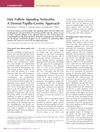4 citations,
May 2023 in “Cells” Baricitinib and its combination with lonafarnib improve fat cell formation in certain genetic disorders.
4 citations,
May 2022 in “Medicina” Kampo medicine can help treat general fatigue from long COVID.
3 citations,
September 2021 in “BioEssays” Dandruff might be caused by changes in how hair follicles naturally release oils and an immune response to this imbalance.
2 citations,
December 2023 in “International journal of molecular sciences” Wound healing is greatly affected by the types of bacteria present, which can either help or hinder the process.
2 citations,
June 2023 in “Journal of clinical medicine” Soy supplements improve various skin conditions and aging signs, with topical use boosting skin barrier function.
 2 citations,
March 2023 in “The Lancet. Respiratory medicine”
2 citations,
March 2023 in “The Lancet. Respiratory medicine” Long COVID is a serious, long-lasting illness that needs more recognition and support.
1 citations,
March 2024 in “Nanomaterials” Biomimetic scaffolds are better than traditional methods for growing cells and could help regenerate various tissues.
 1 citations,
November 2023 in “BMC chemistry”
1 citations,
November 2023 in “BMC chemistry” Tadalafil and Finasteride may help treat aggressive melanoma.
 1 citations,
April 2023 in “International Journal of Molecular Sciences”
1 citations,
April 2023 in “International Journal of Molecular Sciences” New CRISPR/Cas9 variants and nanotechnology-based delivery methods are improving cancer treatment, but choosing the best variant and overcoming certain limitations remain challenges.
1 citations,
January 2018 in “Advances in cancer prevention” Preventing cancer involves lifestyle changes, vaccinations, early screening, and understanding cancer's molecular basis.
1 citations,
November 2011 in “British journal of pharmacology” Enzymes are classified into six types and are essential for many biological processes, with only a few targeted by drugs.
January 2025 in “Pharmaceuticals” Peptide-based hydrogels are promising for healing chronic wounds effectively.
August 2024 in “Nutrients” Probiotics help reduce hair loss and increase hair growth in people with androgenic alopecia.
 August 2024 in “EMJ Dermatology”
August 2024 in “EMJ Dermatology” Non-scarring alopecia in females affects emotional well-being and requires accurate diagnosis and personalized treatment.
 July 2024 in “Skin Appendage Disorders”
July 2024 in “Skin Appendage Disorders” The supplement significantly improves hair density and appearance in people with hair loss.
 July 2024 in “Journal of Cosmetic Dermatology”
July 2024 in “Journal of Cosmetic Dermatology” Vegan collagen builder improves hair growth, skin smoothness, and reduces wrinkles and pain.
 January 2024 in “Authorea (Authorea)”
January 2024 in “Authorea (Authorea)” Nanomaterials can significantly improve wound healing and future treatments may include smart, real-time monitoring.
 July 2023 in “International Journal of Endocrinology”
July 2023 in “International Journal of Endocrinology” Centratherum anthelminticum seed extract effectively treats Polycystic Ovary Syndrome in rats.
May 2022 in “Journal of the Dermatology Nurses' Association” The convention highlighted the importance of comprehensive patient care and early diagnosis in dermatology.
 July 2021 in “Open access journal of biomedical science”
July 2021 in “Open access journal of biomedical science” A lotion with natural extracts significantly sped up hair growth in women with hair loss from chemotherapy.
July 2021 in “Veterinary record/The veterinary record” A calf in Scotland likely had Schmallenberg virus from its mother.

Supplements improve health, appearance, and athletic performance.
 1 citations,
February 2022 in “Open Access Macedonian Journal of Medical Sciences”
1 citations,
February 2022 in “Open Access Macedonian Journal of Medical Sciences” Low zinc levels might contribute to early hair graying.
 158 citations,
May 1968 in “The journal of nutrition/The Journal of nutrition”
158 citations,
May 1968 in “The journal of nutrition/The Journal of nutrition” Zinc is crucial for growth and health in rats.
 January 2024 in “Biochemical and Biophysical Research Communications”
January 2024 in “Biochemical and Biophysical Research Communications” Lack of zinc can cause hearing loss by damaging important parts of inner ear cells in mice.
13 citations,
July 2018 in “Obesity surgery” Over half of patients had hair loss after weight-loss surgery, especially women, linked to low zinc and vitamin B12 levels.
 28 citations,
September 2013 in “Journal of Investigative Dermatology”
28 citations,
September 2013 in “Journal of Investigative Dermatology” The document concludes that dermal papilla cells are key for hair growth and could be used in new hair loss treatments.
 19 citations,
January 2015 in “Scientific Reports”
19 citations,
January 2015 in “Scientific Reports” GPR39 is linked to certain cells in the sebaceous gland and helps with skin healing.
 3 citations,
January 2019 in “Jikken doubutsu ihou/Jikken doubutsu/Experimental animals/Jikken Dobutsu”
3 citations,
January 2019 in “Jikken doubutsu ihou/Jikken doubutsu/Experimental animals/Jikken Dobutsu” Pigs without the Hairless gene showed skin and thymus changes, useful for studying human hair disorders.
 February 2020 in “Our Dermatology Online”
February 2020 in “Our Dermatology Online” A synthetic drug and a South American herb may help treat alopecia areata in Chinese men.
















